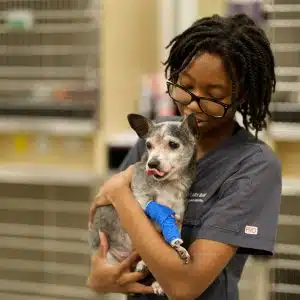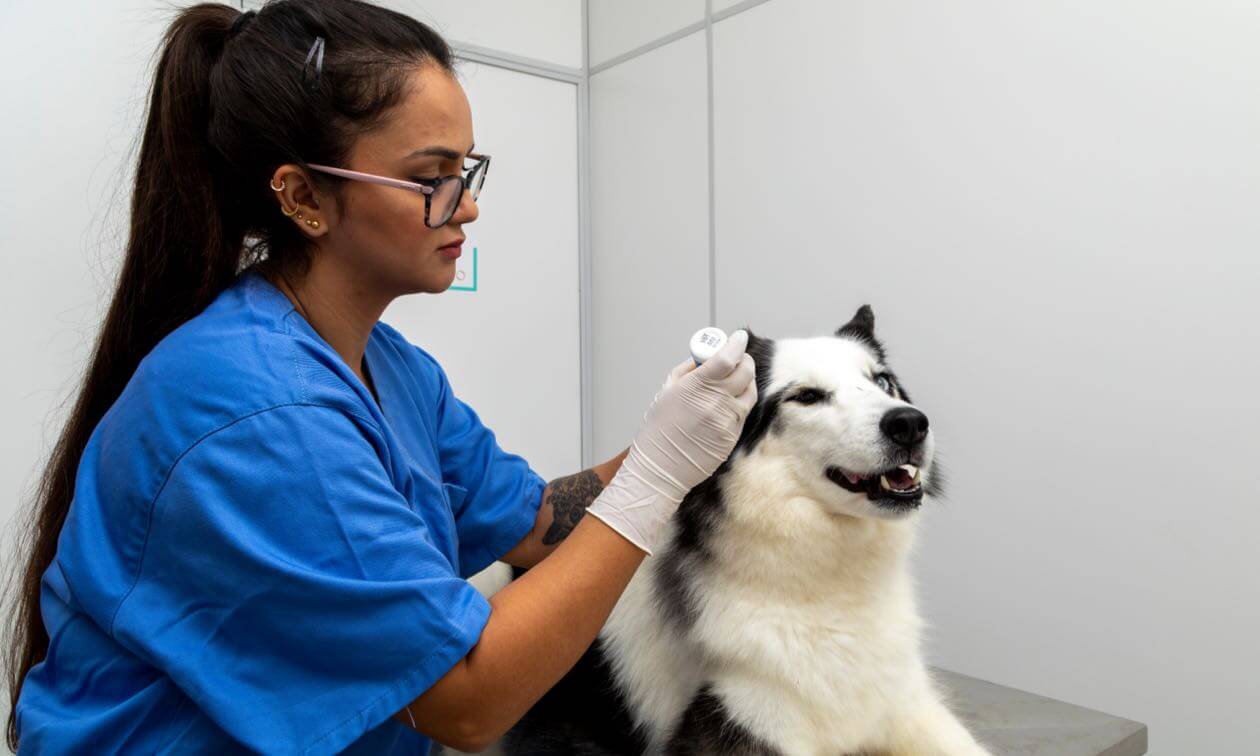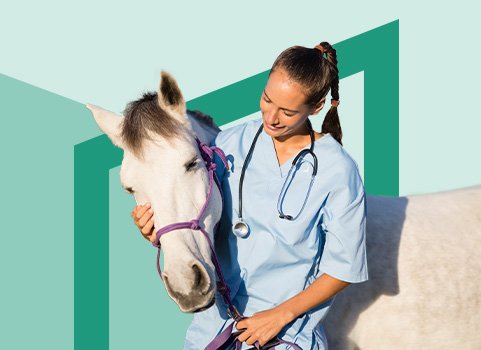Benefits of using Veterinary Oncology Services for your cat
Wiki Article
How a Veterinary Oncologist Can Aid Improve Your Family pet's Top quality of Life
Vet oncologists focus on the diagnosis and therapy of cancer cells in animals, playing a crucial duty in boosting their lifestyle. They develop individualized treatment plans that attend to the special needs of each animal. Through innovative diagnostics and targeted treatments, these professionals intend to handle symptoms properly. The journey does not finish there. Checking out the full range of treatment options reveals even more regarding how these specialists can make a considerable difference.
Comprehending the Role of a Vet Oncologist

In addition to diagnosis, veterinary oncologists develop comprehensive treatment techniques customized to the demands of each family pet. These methods may consist of chemotherapy, radiation therapy, and surgical interventions, targeted at not just prolonging survival yet also improving the total quality of life. Additionally, they supply palliative treatment, concentrating on discomfort monitoring and comfort for animals dealing with incurable medical diagnoses. By teaming up with pet owners, veterinary oncologists ensure that family pets obtain one of the most compassionate and efficient treatment possible throughout their cancer cells trip.
Customized Therapy Prepare For Your Pet dog
When a pet is detected with cancer cells, creating a tailored treatment plan becomes important for addressing their distinct needs and circumstances. A veterinary oncologist carefully evaluates the sort of cancer, its phase, and the general health and wellness of the animal. This comprehensive assessment allows for the production of a tailored technique that may consist of a mix of radiation, chemotherapy, and surgery treatment.The oncologist also considers the family pet owner's preferences and lifestyle, ensuring that the strategy straightens with their goals for their animal's care. Board Certified Veterinary Oncologist. Treatment plans are not static; they are frequently evaluated and adjusted based on the pet's response and any kind of emerging demands. By concentrating on personalized care, vet oncologists aim to enhance the performance of treatments while maintaining the pet dog's lifestyle. This customized technique fosters a much better understanding of the condition, empowering family pet proprietors to make informed choices concerning their beloved buddies' wellness
Managing Signs and Side Impacts
Managing the signs and negative effects of cancer therapy is an essential component of veterinary oncology. Vet oncologists make use of a variety of techniques to alleviate discomfort and enhance the total wellness of pet dogs going through treatment. This might consist of the usage of anti-nausea drugs to combat throwing up and anorexia nervosa, which are common negative effects of radiation treatment. Pain administration is likewise focused on, typically entailing the prescription of analgesics customized to the family pet's specific demands.On top of that, oncologists may advise dietary changes, incorporating premium, easily digestible foods to support nutritional intake. Checking blood work is vital to find any unfavorable reactions to therapy early, enabling timely treatments. Routine follow-ups enable the vet team to assess the pet dog's action to therapy and make necessary changes. Through these comprehensive strategies, veterinary oncologists intend to enhance the lifestyle for pet dogs dealing with cancer cells treatment obstacles.
Palliative Treatment and Comfort Procedures
Palliative care plays an essential duty in enhancing the lifestyle for animals diagnosed with cancer cells, concentrating on comfort and psychological support instead of curative therapy. Veterinary oncologists prioritize discomfort management, assuring that pets experience minimal discomfort throughout their illness. This consists of the use of anesthetics, anti-nausea drugs, and other therapies customized to specific needs.Along with medicinal interventions, environmental adjustments can significantly enhance a pet dog's lifestyle. Producing a tranquility, comfortable space with soft bed linen and simple accessibility to food and water can alleviate stress. Nutritional support is likewise important; oncologists might suggest customized diets that provide to the animal's demands and preferences.
Emotional support for both the pet dog and its owners is vital. Veterinary oncologists give assistance on dealing strategies, assisting family members navigate the emotional obstacles that accompany a cancer medical diagnosis. Eventually, palliative treatment goals to ensure that animals receive the dignity and convenience they deserve.
Collaborating With Your Normal Vet
Cooperation with a routine veterinarian is vital for enhancing the treatment of pets with cancer cells, as this partnership guarantees a detailed approach to treatment and lifestyle. The routine vet commonly has a detailed understanding of the animal's case history, which is crucial when developing a treatment plan. They can efficiently connect with the vet oncologist, ensuring that all aspects of the pet dog's wellness are considered.This cooperation permits worked with care, which might include routine examinations, keeping an eye on side results, and changing medications as needed. Normal veterinarians can also give psychological assistance to family pet proprietors, assisting them navigate the complexities of cancer cells therapy - Board Certified Veterinary Oncologist. By working carefully with vet oncologists, they can help with a seamless change between various kinds of treatment, making sure that animals receive one of the most reliable treatments while maintaining their convenience and wellness throughout the process. With each other, they enhance the general top quality of life for pets dealing with cancer cells
Frequently Asked Concerns

What Sorts of Cancers Do Vet Oncologists Commonly Treat in Pets?
Veterinary Pet Cancer Surgery oncologists typically treat various cancers cells in pets, consisting of lymphoma, mast cell growths, osteosarcoma, and soft cells sarcomas. These professionals utilize sophisticated diagnostic techniques and treatment alternatives to resolve the details requirements of each animal.Exactly How Can I Prepare My Animal for a Vet Oncology Consultation?
Preparing a pet for a veterinary oncology visit entails celebration medical records, noting signs, and preparing concerns. Guaranteeing the pet is calm and comfortable during traveling can likewise considerably boost the general experience and assessment efficiency.Exist Any Type Of Alternate Treatments for Pets With Cancer?
Different treatments for pets with cancer often include acupuncture, natural medication, and dietary assistance. These approaches may match traditional therapies, possibly boosting overall health and offering supportive care throughout the animal's cancer cells journey.Just how Typically Should My Pet See the Veterinary Oncologist?
The regularity of check outs to a vet oncologist generally relies on the family pet's certain condition and treatment strategy. Regular evaluations might be recommended every couple of weeks or months to check development and change treatments accordingly.What Costs Are Associated With Vet Oncology Providers?
Expenses connected with vet oncology services can vary widely, consisting of first examinations, diagnostic tests, therapy strategies, and continuous care. Veterinary Oncologist. Pet proprietors ought to prepare for potential expenditures that show the complexity and period of the treatment neededVet oncologists specialize in the diagnosis and treatment of cancer in pet dogs, playing an essential function in improving their top quality of life. Several family pet proprietors might not be familiar with the ins and outs of vet oncology, understanding the function of a veterinary oncologist is vital for managing cancer cells in pet dogs. The oncologist also thinks about the pet owner's choices and way of living, guaranteeing that the strategy aligns with their objectives for their family pet's care. By concentrating on customized treatment, vet oncologists aim to enhance the performance of therapies while preserving the family pet's quality of life. By functioning closely with veterinary oncologists, they can help with a seamless change between various kinds of care, making certain that animals obtain the most effective treatments while keeping their comfort and wellness throughout the procedure.
Report this wiki page